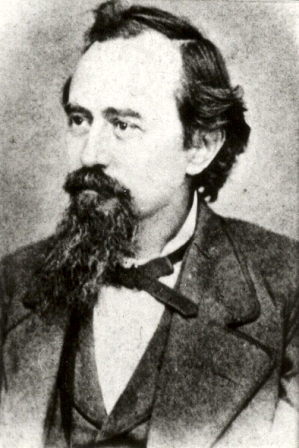Levin Major Lewis facts for kids
Quick facts for kids
Levin Major Lewis
|
|
|---|---|
 |
|
| Born | January 6, 1832 Baltimore, Maryland |
| Died | May 28, 1886 (aged 54) Los Angeles, California |
| Buried |
Greenwood Cemetery
Dallas, Texas |
| Allegiance | |
| Service/ |
|
| Years of service | 1861–1865 |
| Rank | Assigned to duty as: Brigadier General |
| Commands held | 16th Missouri Infantry Regiment |
| Battles/wars | American Civil War |
Levin Major Lewis (born January 6, 1832 – died May 28, 1886) was a colonel in the Confederate States Army during the American Civil War. He was given the role of a brigadier general near the end of the war in May 1865. However, this promotion was not made official by the Confederate President or approved by the Confederate Senate.
Lewis moved to Missouri around age 22. He first worked as a lawyer, then became a Methodist minister. From 1856 to 1859, he was the principal of Plattsburg College. When the Civil War began, he helped create a company for the pro-Confederate Missouri State Guard. He was chosen as its captain.
Lewis was elected colonel of a cavalry regiment in April 1861. After his regiment's term ended, he briefly worked for Major General Earl Van Dorn. Later, he became a captain in the Confederate 7th Missouri Infantry. He was wounded four times during the Battle of Lone Jack in Missouri on August 16, 1862. His regiment was later reorganized, and he became a major, then a colonel, of the 16th Missouri Infantry.
Lewis was wounded and captured at the Battle of Helena, Arkansas, on July 4, 1863. He was held as a prisoner of war in Ohio until September 1864. After the war, Lewis returned to being a minister. He also served as president of several colleges and taught English at Texas A&M University.
Early Life and Education
Levin Major Lewis was born in Baltimore, Maryland, on January 6, 1832. His parents were John Kendall and Mary (Jones) Lewis. They were a wealthy family of planters from Dorchester County, Maryland. Lewis's father passed away when he was young, and an uncle raised him in Vienna, Maryland.
Lewis attended school in Washington, D.C. in 1843. He also studied at the Maryland Military Academy and Wesleyan University in Middletown, Connecticut. He left Wesleyan during his second year to study law. Around 1854 or 1855, he moved to Missouri. He practiced law for a short time before becoming a Methodist minister. He served churches in Liberty, Missouri and Missouri City, Missouri. From 1856 to 1859, Lewis was the principal of Plattsburg College in Plattsburg, Missouri.
Lewis was married to Margaret Barrow.
Service in the American Civil War
Levin Major Lewis quickly became involved in the Civil War. He helped organize a company for the pro-Confederate Missouri State Guard and became its captain. In April 1861, he was elected colonel of the 3rd Cavalry Regiment. This regiment was part of the 5th Division of the Missouri State Guard, led by Major General Sterling Price.
In March 1862, Lewis became a volunteer aide-de-camp for Major General Earl Van Dorn. An aide-de-camp is an officer who helps a higher-ranking general.
On June 18, 1862, Lewis was chosen as a captain in the Confederate 7th Missouri Infantry. He was wounded four times at the Battle of Lone Jack, Missouri, on August 16, 1862. One wound was from a musket ball that hit his forehead. He was able to remove it himself.
After the Battle of Lone Jack, Lewis's regiment was broken up. He then became a major in another unit, which was later called the 16th Missouri Infantry Regiment. On December 4, 1862, he was promoted to lieutenant colonel. His regiment fought at the Battle of Prairie Grove on December 7, 1862. Lewis became the colonel of the regiment in March 1863.
On July 4, 1863, Lewis led his regiment in an attack on the Union Army at the Battle of Helena, Arkansas. The attack was not successful, and Lewis was wounded and captured. He was held at a prisoner of war camp in Johnson's Island, Ohio. He was released and exchanged in September 1864. Lewis then went to Richmond, Virginia, the Confederate capital. He turned down an offer to join the Confederate Senate and went back to his regiment.
On May 16, 1865, General E. Kirby Smith assigned Lewis to duty as a brigadier general. This was so Lewis could command an infantry brigade with a higher rank. However, the war was almost over. The main Confederate army had surrendered a month earlier, and President Jefferson Davis was captured six days before. General Smith did not have the legal power to promote officers to general rank. Even though Lewis wanted to keep fighting, General Smith realized the Confederacy had lost. He surrendered his forces on May 26, 1865.
Life After the War
After the Civil War ended, Lewis went back to being a Methodist minister. He served churches in Shreveport, Louisiana, Galveston, Texas, and St. Louis, Missouri.
Lewis also worked in education. He was president of Arcadia Female College in Missouri from 1870 to 1873. He then led Arkansas Female College from 1874 to 1878. In 1880, he was president of Marvin College in Waxahachie, Texas. For a year, from 1878 to 1879, he was a professor of English and the first head of the English Department at Texas A&M University. In 1884, he became the pastor of the First Methodist Church in Dallas, Texas.
Levin Major Lewis passed away on May 28, 1886, in Los Angeles, California. He had gone there for health reasons. He is buried in Greenwood Cemetery in Dallas, Texas.
 | Calvin Brent |
 | Walter T. Bailey |
 | Martha Cassell Thompson |
 | Alberta Jeannette Cassell |

